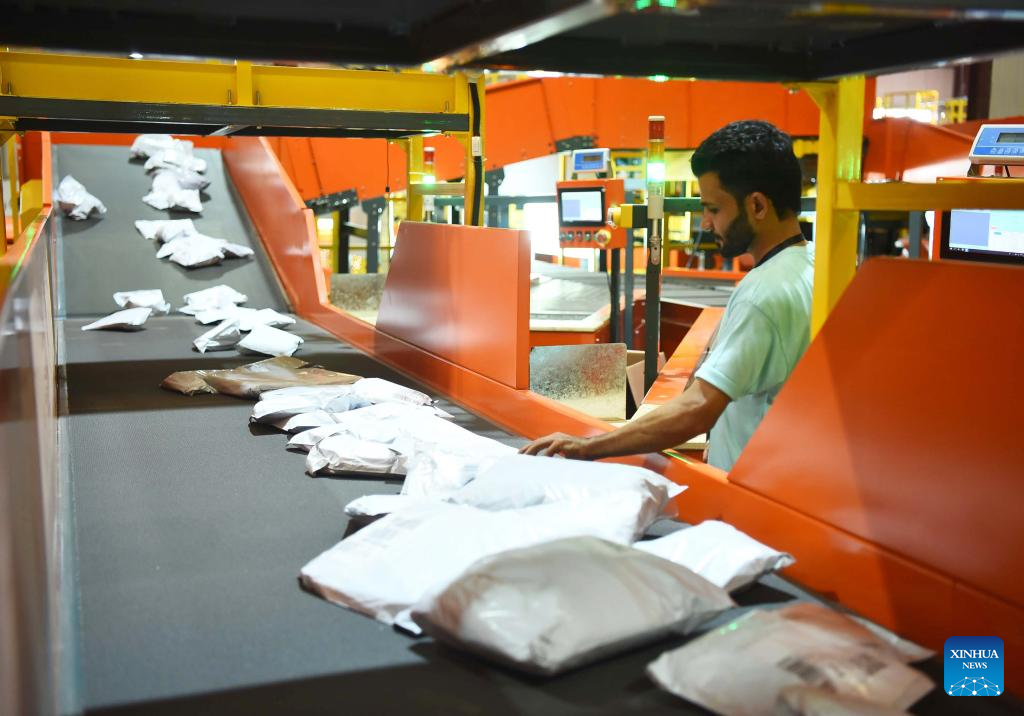




- BRNN
- BRI News
- BRNN News
- Database
Official Documents Polices and Regulations
Inter-government Documents International Cooperation BRI Countries
Business Guide Economic Data BRI Data
Trade
Investment Projects Latest projects
Cases - Content Pool

This photo taken on Oct. 13, 2022 shows employees working at the smart distribution center in Karachi, Pakistan. (Str/Xinhua)
ISLAMABAD, Oct. 19 (Xinhua) -- Pakistan has put its first-ever smart distribution center (SDC) into operations in the country's southern port city of Karachi, with experts and officials hailing the development as a milestone towards revolutionizing Pakistan's e-commerce ecosystem.
Built by Cainiao Smart Logistics Network of China in partnership with Daraz, the largest player in Pakistan's e-commerce market, the 50,000-square-meter-large distribution center will be one of the most technologically advanced logistics facilities in South Asia, equipped with an automatic assembly line and smart distribution set-up with least human interference to ensure operational quality and stability.
Talking to Xinhua, Syed Zamin Ali, project manager of the SDC in Karachi, said that Pakistan's e-commerce industry has been witnessing a robust growth over the last few years and the number of registered e-commerce merchants, platforms and online payment facilities are also on the rise, showing that more and more Pakistani people are making digital purchases and payments.
According to the latest data released by the State Bank of Pakistan, the e-commerce market in fiscal year 2020 is estimated to have expanded to 234.6 billion rupees (1.07 billion U.S. dollars) from 150.8 billion rupees in the previous year, up 55.6 percent on a year-on-year basis.
"With the size increase of the e-commerce market of Pakistan and considering the future prospects, there is a dire need of improving our logistics capabilities to boost our customers' experience," Ali said.
"Both sellers and buyers were facing difficulties due to an outdated manual distribution system which involved a number of tedious tasks and labor before the package actually reached its destination," he said, adding that the manual task was heavily error-prone and time-consuming, undermining customers' trust.
Thanks to the newly introduced automated distribution center, the project manager said most of the problems have now been solved as it would decrease manual errors by 90 percent and increase the sorting capacity by over four times.
In the coming days, the Chinese firm is going to operationalize another smart logistic hub in Lahore, the provincial capital of Pakistan's largest Punjab province, Ali said, expressing hope to build more of such centers across the country to bring more efficiency to Pakistan's logistics sector.
Enthusiastically operating the new SDC, 25-year-old Younus Khan was optimistic to dispatch millions of packages in the coming days as a mega sale campaign is just around the corner, saying "now we are fully equipped to make on-time deliveries without any error."
"I, along with other staff members, have been learning about the new system from the Chinese engineers over the last few months. The hard work bears fruit as now we have made it fully operational. The knowledge, skills, and devotion of our Chinese brothers really inspired me a lot," Khan told Xinhua.
He said that the two logistic facilities in Karachi and Lahore have a capacity to process around 1 million orders a day, making them the most efficient facilities in Pakistan. "I believe it is just the start of something big in the country's e-commerce industry."
Congratulating the Chinese and Pakistani experts for successfully accomplishing the new venture, Commerce Minister Syed Naveed Qamar said the SDCs would provide smart solutions to problems being faced by the supply chain systems and help the e-commerce industry usher in a new era of smart logistics.
E-commerce has become one of the key drivers of Pakistan's economy, and the investment by the Chinese firm in the industry will be a game changer for Pakistan and beyond, he said.
"China is the world's largest e-commerce market with annual online sales worth hundreds of billions of dollars, and Pakistan has a lot to learn from them in terms of knowledge base, experience and technology to take our e-commerce industry to new heights," Qamar told Xinhua.
He said there is a huge potential in Pakistan's e-commerce market, and the incumbent government has been making efforts to incentivize the industry to speed up digital transformation. (1 U.S. dollar equals 218.69 Pakistani Rupees)

This photo taken on Oct. 13, 2022 shows an employee working at the smart distribution center in Karachi, Pakistan. (Str/Xinhua)

This photo taken on Oct. 13, 2022 shows employees working at the smart distribution center in Karachi, Pakistan. (Str/Xinhua)

Tel:86-10-65368972, 86-10-65369967